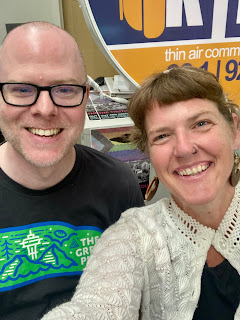 |
Upon finishing Lord of the Flies,
barefooted |
Lord of the Flies by William Golding came into the world in 1954, and while I am typically not a fan of the question regarding whether a book can live past its epoch, I repeatedly wondered this while reading. Is the book of its time, such that it can't fully reach us in our present? Or am I uniquely numbed to terror, listening nightly to true murder stories, such that I am not shocked to find a group of choir boys descend into chaos, murder, and tyranny?
A few years ago, I bought this copy of Lord of the Flies in one of those weak moments in a bookstore when you find yourself at a display shelf of new covers on old books, and decide that yes, you need this book, despite the fact that you can locate it in every library and used bookstore in the same city.
(I somehow missed every class and professor who assigned this book, yet found myself reading The Great Gatsby three or four times. This is neither here nor there but simply the power-ball situation that is syllabi book lists.)
And this week, I finally read it. The book has saturated our culture to the point that nothing was surprising about the story or its pointed questioning of the world. When left to our own devices, child or adult, will some kind of internal, ethical compass save us from our human desire for power? What in us gravitates toward reasoning, democracy, and community? What external forces prevent us from descending into an irrational death spiral in which we take out anyone who seems weak as a way to solidify the group?
The answer in Lord of the Flies is that a few people will have an ethical, well-meaning compass and follow it, no matter the cost to themselves, but for the most part, everyone else will kill you first and worry about it later, if at all.
It was, of course, novel for Golding to situate such questions within the world of children; much of the story's horror comes from the collision of the murderous adult world with the idealized perception of children as innately good, prone to kindness, and perfectly innocent.
Lord of the Flies begins with a plane crash on a remote island, with a couple dozen surviving children--perhaps members of a church or boys' choir. No adults survive the crash, and so the remaining children eventually gather, begin trying to create a livable situation and tend an ever-burning fire such that a nearby ship might see and come rescue them.
All manner of books and stories have since explored the same theme and questions. Most popularly, the Hunger Games series, any number of Stephen King books (e.g., The Running Man or The Long Walk), the well-known story "The Lottery" by Shirley Jackson, Octavia E. Butler's Parable of the Sower, and innumerable others.
This isn't to say that writers should stop exploring the human heart, its drive to be all-powerful and revered, or how murder and war are a terrifying cycle from which no one can seemingly save us, child or adult. Unlike fire putting out fire, war does not seem to put out war.
What I do think is that Lord of the Flies is a well-told story, but it will not shake anyone to the core now that we live in a world where children shoot each other in schools, roadsides, and homes. Where children bully each other online until the bullied child dies by suicide. Where children haze each other until someone accidently dies, and everyone feigns surprise. Where adults with guns barge through schools, malls, concerts, parades, and movie theaters. Where we can daily find images, should we choose to search--of dead immigrant children washed onto beaches, drowned with their parents, or if by luck, starving into a slow death. Children left in pieces in bombed cities or left to live, blind and torn apart by landmines left over from old wars.
In Lord of the Flies, the children elect one of the older children, Ralph, to be the leader. The children talk about themselves as tribes and savages. There's another kid who wanted to be leader, and eventually, that desire for power leads to the mayhem and murder that come toward the end of the book. Early on, the children go about the business of creating a mirror of what they know: shelter, food-finding, a democracy in which every child is allowed to speak as long as he's holding the beautiful conch shell. Later, once the child who yearned to be leader successfully kills a wild pig with the help of others, the monstrosity of the killing starts the slow plunge toward anyone now being seen as nothing more than a wild pig--or less than, since the children who later die serve no purpose other than to terrify the others into following the new leader/tyrant.
Here are some reasons to read it:
- Everyone else has read it, so you ought to read it in order to understand how deeply the book has permeated the culture;
- It will shed some light on the era of its publication, and the concerns that come out of WWII and the Holocaust;
- You'll be reminded of how saturated our lives are with murder and death, such that this book does not feel full of terror as it must have many decades ago;
- Should the book-banners remember this book exists, it will be banned again, and one ought to know what others find worth censoring (I just learned that it's one of the top ten most challenged/censored books);
- To have an uninterrupted time dwelling on why people form groups and how that can go terribly wrong with the leader who takes power;
- The scene wherein you learn why the book has its title and then dwelling on that and its implications regarding the children;
- Perhaps you are a teacher and need to assign a book like Hunger Games that will not be immediately challenged by parents. I'd think that this seventy-year old book will have slipped off the radar of the well-meaning censors. (But, if it's still in the top ten challenged, I clearly know little about any of that.) You will need to deal with the book's savage/civilized duality and the writer's implications that native people are representative of destruction while white people are inherently "civilized." That the story exists without girls, except for the off-stage mothers that the children yearn for, should be factored in when selecting it and be a topic of discussion. "The Lottery" would be a well-chosen companion reading.
Overall, I'm glad to have read it, to meet the character Piggy beyond what I've picked up here and there, and to read how it ends. I did not expect to become endeared to Ralph but here we are. There were a a handful of images so vivid and shattering that the book is probably worth reading simply for those. One, for example, is the corpse of a parachuter that gets caught in the trees.
Note: The edition I bought came sandwiched between introductions, notes, and theory, but I think you'll be fine reading an edition that contains only the story. But if you like the extra pages to expand your own illuminating thoughts, then go for a newer edition.
🕮


.jpg)






.jpg)
